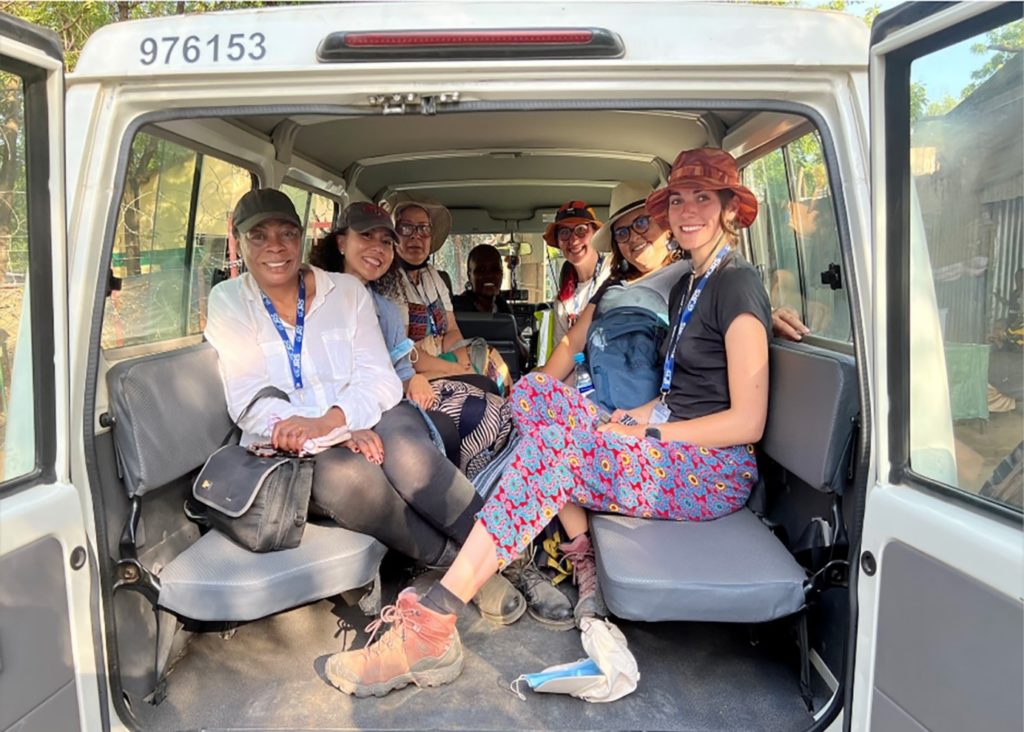By Margaret Lombe, PhD.
My reflection centers on my engagement, along with six students from Boston University School of Social Work (BU-SSW), with refugees in Kenya: dignified-citizens-turned-objects-of-charity by conflict and civil unrest. The largest refugee camp in the world, called Kakuma, lies on the edge of the Sahara Desert in northwestern Kenya. Kakuma holds about 350,000 people displaced from 21 African countries including Sudan, Uganda, Rwanda, the Democratic Republic of Congo, Somalia, and Djibouti. Most people in the camp have fled violence, civil war, conflict, human rights violations, persecution, droughts, food insecurity, and government instability.
In the Summer of 2023, working in collaboration with Jesuit Refugee Services, my students and I embarked on a project to engage with refugee women who had experienced gender-based violence. The project, which centered on planting a vegetable garden, was developed in consultation with the women. The goal was to help bring healing and a sense of community to the 10 women who had endured sexual violence, trauma, and displacement. We found common ground despite our differences in background and experiences. For my students and me, the push was our commitment to social justice and human rights. For the women, their engagement with us was from a sense of curiosity and appreciation for the strangers who wanted to accompany by planting a garden on the edge of the Sahara Desert. For several days the hot Sahara sun beat down our sweat-drenched bodies as we, alongside the women, dug, raked, and sowed vegetable seeds.
We later learned that for the women, planting the garden was more than just growing vegetables. It was an act of witness, accompaniment, and deep solidarity. It was also an act of claiming the land for themselves and their children. On our last day of working with the women, I recall the women saying to us, “You stood by our side and made a garden with us. Your sweat and our sweat mingled in the soil. You made this land our home, and you made us feel a sense of belonging.” These women had endured so much! Imagine yourself crying for help in the face of atrocity and the only sound you hear is the echo of your own voice!
We were all crying as we said our goodbyes. At a time when the world seems to have turned its back on them, the women found solidarity in each other and in the hearts of strangers, privileged women from across the Atlantic.
When we started working with the women at Kakuma Refugee Camp, our goal was to look at the human rights frameworks, especially the portion of the Geneva Conventions that was established in 1977 to protect civilians–including women and children (the United States has signed but not ratified this portion). Our experience at Kakuma revealed the impact of conflict and war on women and children, and the limits of international instruments in protecting these vulnerable groups. Indeed, in 2022 alone, the United Nations reported that more than 114 million people had been displaced from their homes. That number does not include people made vulnerable by the Israel-Hamas War.
In normal situations, about one in five women are likely to experience gender-based violence in their lifetime—the situation is more dire during conflict and war. Why? In times of war, women experience erosion of the layers of protection that surround them—they experience loss of community, breakdown of rule of law, and loss of other forms of support, feeding into the normalization of violence, and making women extremely vulnerable. It’s a phenomenon scholars have said turns women’s bodies into an “extension of the battlefield.”
As we were leaving the camp to return to Boston, my students and I made a commitment not to turn our backs on the women. We walked backwards to symbolize that we will never forget them and the experience they shared with us. This symbolism is something I continue to struggle with. How does one stand with-and-for in the midst of so much suffering? How does accompaniment transcend culture/experience when one has the luxury of returning home? How is the person who returns home transformed, and how can she continue to witness and accompany?
Margaret is associate professor of social work at Boston University and director of their BRIDGE program specialization in global health, social policy, and poverty. She is a Springfield Dominican Associate. This trip was supported by Boston University School of Social Work Center for Innovation in Social Work & Health. Plans to return to Kakuma last summer were scuttled by civil unrest in Kenya. She hopes to return with her students in November 2024.


